Hello and welcome!
This year, because of the pandemic, I was unable to be with my family for Thanksgiving as I ordinarily would, but I was happy to celebrate a live-streamed bilingual Mass that morning at the Cathedral of the Holy Cross. There were a few technical hiccups at first, but eventually, it worked out.
Afterwards, Msgr. O’Leary had a lovely meal for us, where we were able to gather with the priests of the cathedral to give thanks and enjoy each other’s company.
For me, Thanksgiving is one of the most beautiful celebrations that we have as Americans. It’s so easy to take the gifts that God has given us for granted, and the holiday is a reminder that we are called to be good stewards of the gifts that we have received from God’s love.
Friday, I went to Our Lady Help of Christians Parish in Newton to celebrate the funeral Mass of Msgr. Dennis Sheehan, who was a great and very beloved priest of the Archdiocese of Boston. We were all very shocked by his death. I had spoken with him the day before he died and thought that he was on the mend. He was suffering from a blood infection that was being treated but then contracted COVID-19 in the hospital and deteriorated very quickly.
Along with his family, we were joined at the funeral by the auxiliary bishops as well as Bishop Bill Murphy, who came from the Diocese of Rockville Centre to be with us. Msgr. Peter Conley preached the homily. 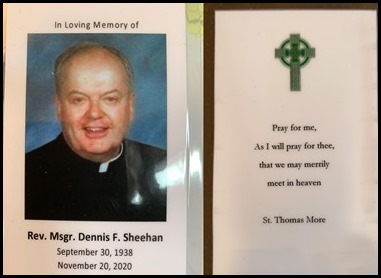
On the back of his memorial card was this lovely quote by St. Thomas Moore, which I think was so fitting.
Msgr. Sheehan’s family had decided to limit participation in the funeral. That was a wise decision because he touched the lives of so many people that it would have been very hard to limit the number of people who would have wanted to participate. I’m sure the family will have a memorial celebration once the pandemic has ended.
In his retirement Msgr. Sheehan functioned as the parochial vicar at Our Lady’s. Of course, he also continued on the board of St. John’s Seminary, on the Personnel Board and with many other responsibilities. He was very active with the Order of Malta, as well. His death leaves a great hole in the archdiocese, but we are grateful for his long and beautiful ministry as rector of Pope John XXIII National Seminary, rector at the Josephinum, his work in Rome, as pastor of St. Paul’s in Cambridge and his ministry with Harvard Campus Ministry and St. Paul’s Choir School. He had a long and beautiful life. We are all grateful for that, but he will be sorely missed.
Saturday was the consistory for the creation of new cardinals at St. Peter’s Basilica. 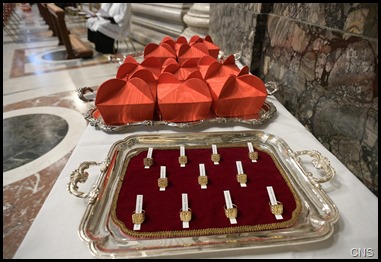
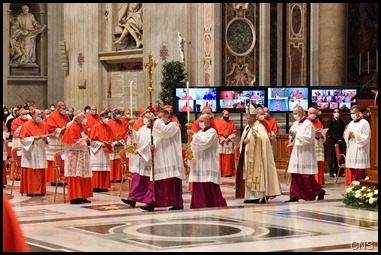
Among the cardinals was, of course, Cardinal Wilton Gregory of Washington. At this point in our history, when we are striving for racial justice in our country, it is a great blessing to have an African-American prelate as a member of the College of Cardinals.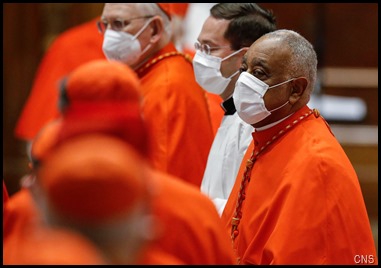 I’m also gratified that two of our Capuchin friars were also named to the College — the Archbishop of Santiago, Chile, who is a Basque Capuchin, Cardinal Celestino Aós and the preacher to the papal household, Cardinal Raniero Cantalamessa. This is the first time in the history of the order that there have been four Capuchin cardinals.
I’m also gratified that two of our Capuchin friars were also named to the College — the Archbishop of Santiago, Chile, who is a Basque Capuchin, Cardinal Celestino Aós and the preacher to the papal household, Cardinal Raniero Cantalamessa. This is the first time in the history of the order that there have been four Capuchin cardinals.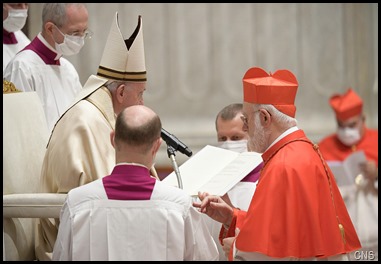
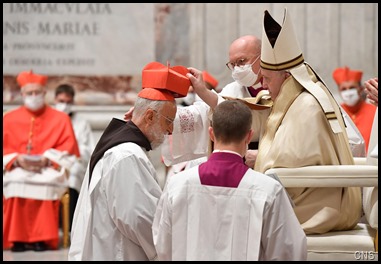 Because of the pandemic, not many cardinals were able to be present physically in the Basilica. In fact, two of the new cardinals themselves were unable to travel to Rome, but the Holy Father moved ahead with the ceremony.
Because of the pandemic, not many cardinals were able to be present physically in the Basilica. In fact, two of the new cardinals themselves were unable to travel to Rome, but the Holy Father moved ahead with the ceremony.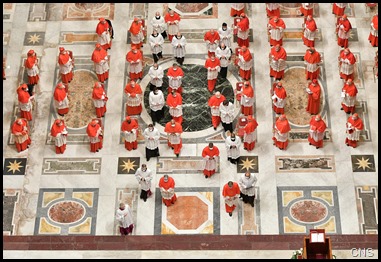 In part because of the small number of cardinals, Pope Francis made the very beautiful gesture of arranging for the new cardinals to greet Pope Benedict.
In part because of the small number of cardinals, Pope Francis made the very beautiful gesture of arranging for the new cardinals to greet Pope Benedict.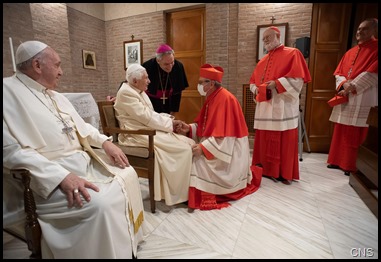
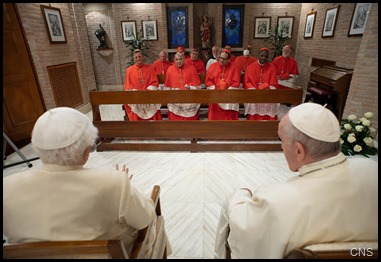 I know the cardinals were all very happy about that, and I’m sure Pope Benedict was touched by the gesture as well.
I know the cardinals were all very happy about that, and I’m sure Pope Benedict was touched by the gesture as well.
Sunday, I celebrated the English Mass at the cathedral. Of course, it was the first Sunday of Advent and, in my homily, I spoke about beginning this very special time of waiting for the Lord.
Monday was the Feast of St. Andrew, and ordinarily, Vito Nicastro and I would gather with Metropolitan Methodios at the Greek Orthodox Metropolis of Boston for Vespers, followed by a meal.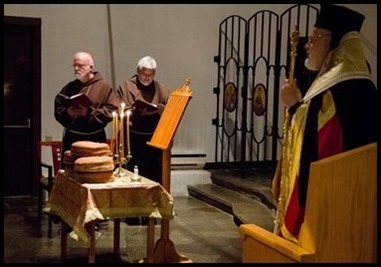
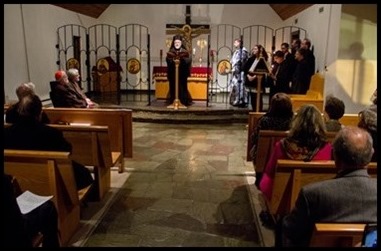
This year, we were unable to be together in person, but I was happy to have the opportunity to at least speak with Metropolitan Methodios, who has been so supportive of the archdiocese and the friendship between our two communities.
That day I also participated in the archdiocese’s iTHIRST Spiritual Companion Virtual Training program, offered for parishioners who wish to provide support for people in addiction recovery.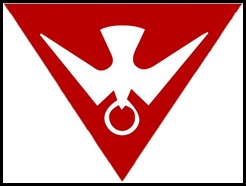
iTHIRST is an initiative of the Missionary Servants of the Most Holy Trinity and, as their mission statement says, it “empowers dioceses, parishes and communities to become a resource for those suffering from addictions and their families. At the heart of iTHIRST is an understanding that there is a spiritual dimension to the disease of addiction that cannot be met by clinical professionals, but only by the spiritual consolation and guidance that the Church can provide.”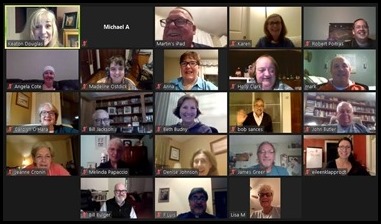
I led the opening prayer, and afterward, we had a time of conversation with the participants. It was so gratifying to see so many people who are seeking to practice Pope Francis’ call to live the “art of accompaniment” by learning how to listen to and dialogue with the vulnerable and marginalized and be a sign of God’s mercy and love to those seeking spiritual support.
Tuesday, there was a virtual meeting of the Council of Cardinals advising the Holy Father on the reform of the Roman Curia.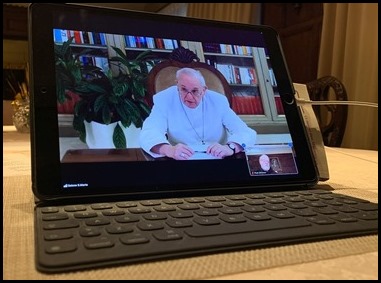
We were very happy to welcome our newest member, Cardinal Fridolin Besungu of Kinshasa, who replaced Cardinal Monsengwo. During this session, we continued our work on the draft of the new Apostolic Constitution for the Roman Curia, “Praedicate Evangelium.”
Later that day, I gathered by Zoom with our recently ordained priests for an afternoon of ongoing formation. It’s always a wonderful opportunity to be able to gather with them. I am sorry that we are unable to be together for a meal, but we continued our tradition of gathering for midday prayer and a time of dialogue. With the increasing spread of COVID-19 and the large number of hospitalizations, we are in the process of reconstituting our team of priests to administer the sacraments to COVID patients. So, we spoke about those plans as well as a number of other themes that the young priests had on their minds.
Thursday was the Feast of Saint Francis Xavier, the patron saint of the missions. So, it was a very fitting day to hold our virtual Mission Education Day for the archdiocese’s Missionary Childhood Association. 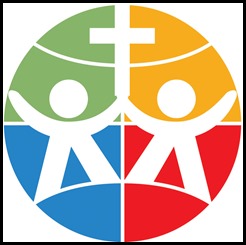 In other years, these mission retreat days are held in person in the Pastoral Center. Ironically, because we were freed from the constraints of in-person attendance, we had probably our biggest gathering ever — with over 600 students from Catholic schools across the archdiocese. It was an opportunity for the young people to learn about their own call to be missionary disciples and the importance of supporting their young brothers and sisters around the world who are in need.
In other years, these mission retreat days are held in person in the Pastoral Center. Ironically, because we were freed from the constraints of in-person attendance, we had probably our biggest gathering ever — with over 600 students from Catholic schools across the archdiocese. It was an opportunity for the young people to learn about their own call to be missionary disciples and the importance of supporting their young brothers and sisters around the world who are in need. 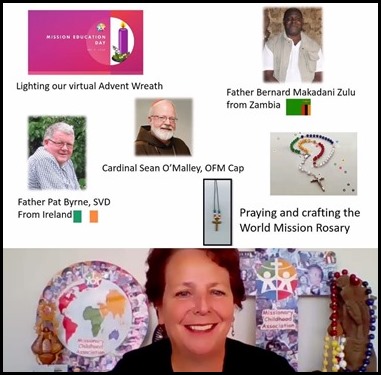 The day was organized by Maureen Heil, our Director of Programs and Development for the Pontifical Mission Societies in the archdiocese, and she led the students in making their own World Mission Rosary. She also emceed the day’s speaking program.
The day was organized by Maureen Heil, our Director of Programs and Development for the Pontifical Mission Societies in the archdiocese, and she led the students in making their own World Mission Rosary. She also emceed the day’s speaking program.
Joining us via Zoom from Zambia was Father Bernard Makadani Zulu, former National Director for the Mission Societies of his country. Father Bernard explained how Missionary Childhood helps bring education, health care, and faith formation to Zambian children. He also talked about his visits to Boston, preaching in our parishes and asking for help for his home diocese. Because of the generosity he found here in the archdiocese, they were able to install running water at the house he shared with four other priests. Before that, they had to walk quite a distance to find clean water.
Father Patrick Byrne, a Divine Word Missionary from Ireland, also talked to the children about his experience as the Secretary General for Missionary Childhood for the world. He was stationed at the Vatican office for 10 years and traveled to projects in the missions to be sure that the programs were being implemented properly. So, he shared some of his experiences of that and talked about the great impact young people can have by supporting the missions. 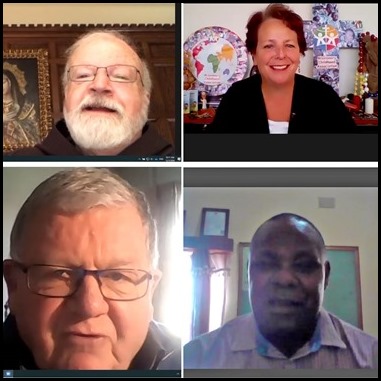
With Maureen, Father Pat and Father Bernard during the gathering
I also spoke to them about my own experience being part of the Missionary Childhood Association myself. (It was called the Holy Childhood Association at that time.) I also encouraged them to consider what their own vocation in life might be.
It was a wonderful encounter, and we hope many children will respond to the invitation and become “young missionaries” as members of the Missionary Childhood Association.
Earlier today, I presided at a wake service for Maureen Harrington, the beloved wife of John Harrington of the Yawkey Foundation for 61 years. 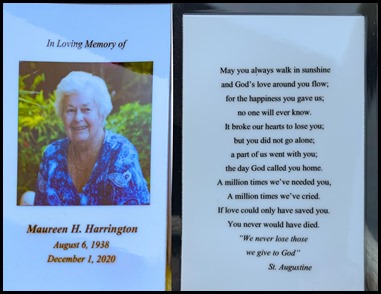 As her family shared in their tribute, the things that mattered most to Maureen were her family, friends and faith. John and the Yawkey Foundation are long-standing friends of the archdiocese, and we extend our condolences to John and the family as they commend their beloved wife, mother and grandmother to the Lord.
As her family shared in their tribute, the things that mattered most to Maureen were her family, friends and faith. John and the Yawkey Foundation are long-standing friends of the archdiocese, and we extend our condolences to John and the family as they commend their beloved wife, mother and grandmother to the Lord.
Finally, I want to remind everyone of the announcement this week that we will extend our observance of the Archdiocesan Year of the Eucharist until the Feast of Corpus Christi in June 2022. 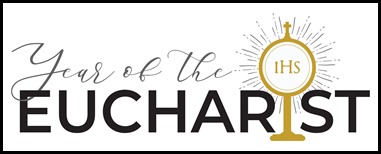 We know many parishes are doing their very best to observe this special year despite current restrictions. However, once the pandemic has passed, we also realize that after so many months of having suspended the Sunday Mass obligation, we will need to make a great effort to reconnect people with the celebration of the Eucharist. The Eucharistic Year is a wonderful opportunity to do that, and so we have decided to push the end date forward into the future.
We know many parishes are doing their very best to observe this special year despite current restrictions. However, once the pandemic has passed, we also realize that after so many months of having suspended the Sunday Mass obligation, we will need to make a great effort to reconnect people with the celebration of the Eucharist. The Eucharistic Year is a wonderful opportunity to do that, and so we have decided to push the end date forward into the future.
Until next week,
Cardinal Seán
